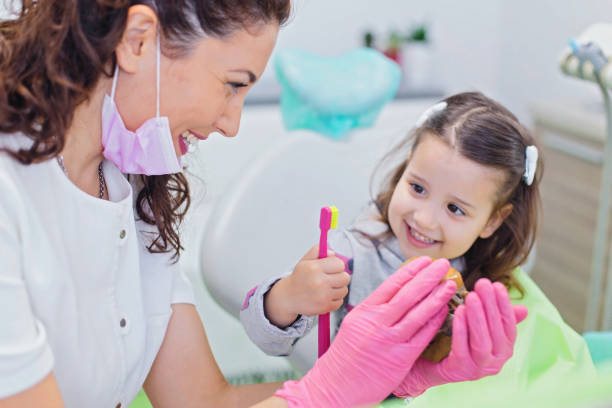Call Us Today
5 Essential Pediatric Dentistry Tips for Parents

As a parent, ensuring your child’s dental health is a crucial part of their overall well-being. Starting good oral hygiene habits early can set the foundation for a lifetime of healthy smiles. Here are five essential pediatric dentistry tips to help parents navigate their child’s dental care journey.
1. Start Early and Be Consistent:
- Introduce dental care routines as soon as your child’s first tooth emerges. Use a soft, damp cloth to clean their gums before teeth appear, then transition to a soft-bristled, child-sized toothbrush once teeth start coming in.
- Establish a consistent daily routine for brushing and flossing. Encourage your child to brush their teeth at least twice a day for two minutes each time, using a pea-sized amount of fluoride toothpaste. Supervise brushing until they have developed the dexterity to do it effectively on their own, usually around age 6 or 7.
- Make dental care fun by using age-appropriate toothbrushes, toothpaste flavors, and incorporating songs or games into brushing time. Positive reinforcement and praise can help reinforce good habits.
2. Watch Their Diet:
- Be mindful of your child’s diet and its impact on their dental health. Limit sugary snacks and beverages, as they can contribute to tooth decay and cavities. Encourage healthier options like fruits, vegetables, cheese, and nuts.
- Avoid giving your child sugary drinks like soda, fruit juice, or sports drinks, especially between meals. Instead, encourage them to drink water, which helps rinse away food particles and neutralize acids in the mouth.
- If your child does consume sugary treats, encourage them to brush their teeth afterward or rinse their mouth with water to minimize the risk of cavities.
3. Schedule Regular Dental Check-ups:
- Regular dental check-ups are essential for maintaining your child’s oral health. Schedule their first dental visit by their first birthday, or within six months of their first tooth erupting, whichever comes first.
- During dental visits, your child’s dentist will examine their teeth and gums, check for any signs of decay or developmental issues, and provide guidance on oral hygiene practices.
- Dental visits also offer an opportunity to discuss any concerns or questions you may have about your child’s oral health. Building a positive relationship with the dentist early on can help alleviate any anxiety your child may have about dental visits.
In conclusion, prioritizing pediatric dentistry is vital for ensuring your child’s oral health and overall well-being. By starting early, establishing consistent routines, monitoring their diet, and scheduling regular dental check-ups, parents can help their children develop healthy habits that will last a lifetime. Remember, dental care should be a positive and enjoyable experience for children, so make it fun and rewarding whenever possible. By following these tips, parents can set their children up for a lifetime of healthy smiles and happy dental visits.